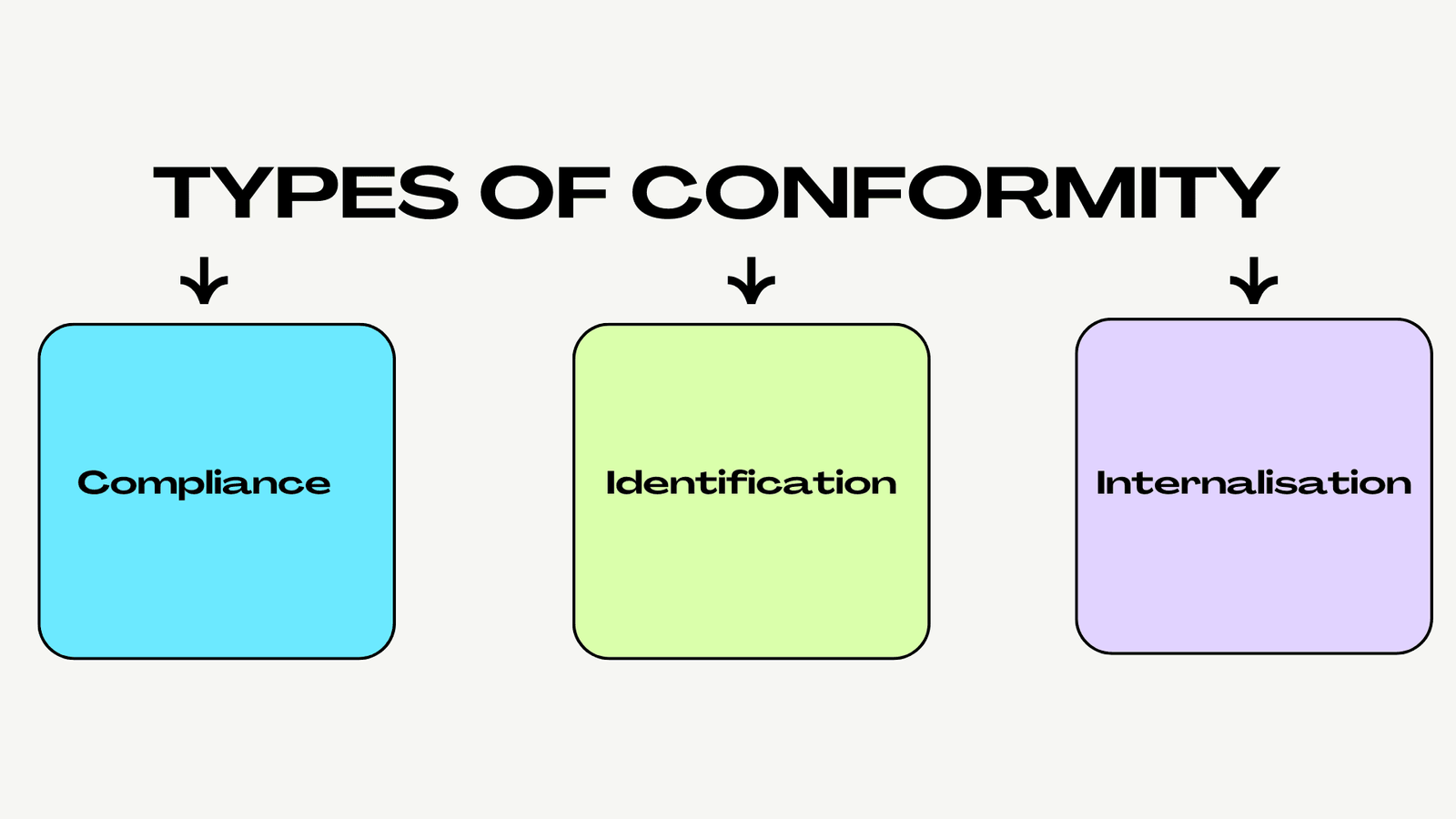Imagine you’re asked to be the participant in a psychological experiment. You’re sitting in a room with a group of 8 other people. A presenter is standing in front of you, showing you plaque cards of different colours. The experiment is simple enough- you just have to identify the colour on the plaque card. He shows a red plaque card and asks the first person what colour they see. Red- they reply. He asks the second person, they also say it’s red. All 9 of you recognise it as red. He carries on doing this for multiple colours; yellow, green, and blue. You seem to be getting irritated now; a child could do this. He pulls out another card- pink this time.
Read More: Conformity: When You Are Not Sure About The Decisions
But when he asks the first person what colour they see, they answer with “black”. That’s not a black card, you think. Maybe they got confused. But the second person to answer is black. So does the third, fourth and all up to the eighth person. It’s your turn now. You look at the plaque card; it is pink, and you’re very sure of it. So what do you answer? Do you choose to stick to your original answer, or do you also answer the same as all others? Chances are, you will also conform and answer with “black”. According to Asch’s research, at least 75% of people will conform.
Understanding conformity
What is described above is very similar to a series of experiments conducted by pioneer social psychologist Solomon Asch in the 1950s. These series of experiments are collectively known as Asch conformity experiments and they study the concept of conformity. The American Psychological Association defines conformity to be “the adjustment of one’s opinions, judgments, or actions so that they become more consistent with (a) the opinions, judgments, or actions of other people or (b) the normative standards of a social group or situation”.
Essentially, individuals tend to act following the unspoken rules of the group or community of which they are a part. For the fear of being the odd one out, you tend to behave in the same way as others around you. It is a deep-seated, private and enduring change in behaviour and attitudes due to group pressure. Researchers, particularly in the field of social psychology, have a keen interest in understanding this phenomenon. Do people want to blend in or do they want to stand out? What lengths will they go to, to avoid being the maverick?
The concept of conformity becomes particularly important when trying to predict human behaviour. Psychologists are primarily interested in how people behave in different situations, and what influences these behaviours. When you enter the bank, why do you choose to stand in the queue, instead of simply barging into the front? Muzafer Sherif proposed that individuals utilize the behaviour of others to establish the range of possible behaviours, a concept known as the frame of reference. To put it simply, it means you look around, observe the different ways in which people are behaving, and then choose to behave in a particular way.
Read More: Understanding the Dynamics of Social Psychology

Types of conformity
Herbert Kelman, a prominent psychologist, put forward 3 types of conformity.
- Compliance: compliance, according to Kelman, is public conformity. You opt to set aside your own beliefs and values and adhere to the norms in order to gain acceptance. You drive in an orderly fashion to evade fines.
- Identification: this is a step deeper than compliance; it is conforming to someone you look up to and respect. You switch from juice to energy drinks, because your favourite athlete endorses it.
- Internalisation: this is the deepest form of conformity and stays with a person for a long time; they accept the belief or behaviour and accept it both publicly and privately. If your doctor (a very credible source) tells you to eat smaller bites to digest your food better and to avoid gaining weight, you start to do that, even when you’re eating alone.
Read More: How to Avoid Herd Mentality and Think Independently
Why do we conform?
The first question that must have popped into your mind after reading the example at the beginning of this article is “Why did you choose to say black, even when you knew that the colour is pink?”. Normative social influence– the most basic way to describe this is the desire to be liked. One of the most successful ways to be liked by others is to appear as similar to them as possible. Very early on, we realise that appearing similar to people and agreeing with them can make them like us. So throughout our lives, we try to appear familiar to those around us.
Parents and peers frequently offer praise and approval for this similarity we demonstrate. Thus, we refer to this as normative social influence, as it entails us altering our behavior to align with others’ expectations. If all your friends start conforming to informational social influence, it essentially reflects our intrinsic desire to be correct.Simply having opinions on matters isn’t enough; we also need to know that our opinions are correct. But, there isn’t any way for you to know if your attitudes are correct.
What, then, do you do? You rely on other people’s opinions and actions as guides for your own. Such reliance on others, in turn, is often a powerful source of the tendency to conform. Other people’s actions and opinions define social reality for us, and we use these as a guide for our actions and opinions. We call this basis for conformity informational social influence because it relies on our tendency to depend on others as a source of information about many aspects of the social world.
Read More: Social Media and its social Norms
The downside of conforming
While conforming may seem innocent and only an attempt to fit in, it can often have disastrous consequences. Recent research by social psychologists shows that pressures to conform, and our tendency to surrender to such pressures, can sometimes result in very harmful effects. A common example of this is bullying. It is often very difficult for children to fit in at school, and also very important for them to do so. Many kids choose to join the “popular” group at school, the exclusive clique that often bullies other students.
Read More: Being Kind Matters: Stopping Bullying and Ragging
Everyone at school wants to be a part of this school, and you do too. So, to be seen as one of the “popular” kids, you too start bullying others and dressing a certain type of way. Even if you oppose bullying and dislike wearing wide-legged jeans, the intrinsic desire for acceptance compels you to engage in both. Even though this example might appear small, we can still apply the same principle to larger audiences.
Take racism, for example. We all are aware that racial discrimination can often take very violent turns. Does everyone who partakes in racism believe that people of colour are inferior? Or have they convinced themselves of this belief solely to gain acceptance within their ethnicity? This is an important question to raise, especially keeping in mind the centuries of racial discrimination that people of different communities have faced.
Read More: Discussing Discrimination Through Mental Health Lens
We have in this article looked at a rather interesting concept of social psychology- conformity, the tendency to change our behaviours to make them more similar to those of those around us. We have talked about the types of conformity, and more importantly, the reasons behind why we conform. It also raises the question- is conformity always good? Can good people sometimes act in bad ways? The answer to this is yes, and the reason- conformity.
References +
- MSEd, K. C. (2023, November 13). The ASCH Conformity Experiments. Verywell Mind. https://www.verywellmind.com/the-asch-conformity-experiments-2794996#:~:text=The%20experiments%20revealed%20the%20degree,the%20rest%20of%20the%20group.
- Wikipedia contributors. (2024, February 19). Conformity. Wikipedia. https://en.wikipedia.org/wiki/Conformity
- APA Dictionary of Psychology. (n.d.). https://dictionary.apa.org/conformity













Leave feedback about this